Dental implant dentures near me is a phrase that resonates with many individuals seeking to restore their smiles and regain confidence after tooth loss. Losing teeth can deeply affect not only one’s oral functionality—making it difficult to eat and speak—but also one’s self-esteem. The good news is that modern dentistry has made significant advancements, offering solutions like dental implant dentures that combine aesthetics with functionality. These innovative devices are designed to resemble natural teeth while providing the stability and support necessary for daily activities. If you’re considering this option, it’s essential to explore your choices thoroughly, understand the process involved, and evaluate the benefits they offer for improved quality of life.
In the quest for a solution, individuals often search for implant dentures near me or denture implants in hopes of finding qualified professionals who specialize in this type of restorative dentistry. Whether you are looking into screw-in dentures near me, which offer a secure fit and ease of maintenance, or are curious about various options available locally, it’s vital to do your homework. This guide will help you navigate through the steps, from researching local dentists to understanding the costs involved, ultimately leading to a healthier and more confident smile.
Evaluating your options for dental implant dentures
The journey toward obtaining dental implant dentures begins with evaluating your options and identifying what best suits your needs. A crucial first step is conducting thorough research to find local dental practices with expertise in dental implants.
Researching local dental practices
Finding a skilled dentist specialized in implant dentistry is paramount for the successful placement and longevity of your dental implant dentures. Fortunately, there are several effective methods to identify qualified dental practitioners nearby.
Online directories
Utilizing online directories can be incredibly helpful in your search. Websites such as the American Dental Association (ADA) and the Academy of Osseointegration (AO) provide comprehensive lists of dentists specializing in implant dentistry. You can easily filter results by location, allowing you to find practitioners who are conveniently located.
These directories often include brief profiles of dentists, detailing their specialties, education, and experience. By reviewing these profiles, you can narrow down your options and shortlist potential candidates. Furthermore, many dental practices have websites that display patient testimonials, before-and-after photos, and detailed information about the services they offer.
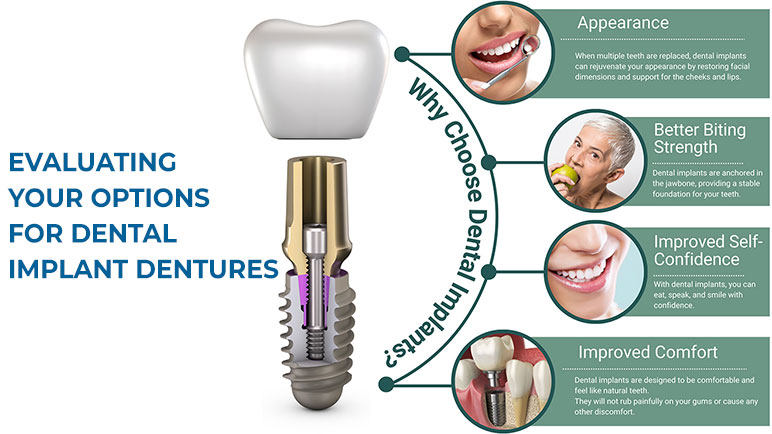
Referrals
Another effective method is to ask for referrals from trusted sources. Speak with family members, friends, or colleagues who have undergone similar procedures. Their firsthand experiences can provide insights into the quality of care they received and whether they would recommend their dentist. Referrals from healthcare professionals, such as your family doctor, can also lead you to reputable implant specialists noted for their expertise in the field.
Insurance provider networks
If you carry dental insurance, checking your provider’s network can simplify your search. Many insurance plans have directories of participating dentists which can help you locate those who offer implant dentistry at reduced out-of-pocket costs. This option not only aids in your search but may also alleviate financial concerns associated with the treatment.
Checking credentials and experience of dentists
Once you’ve created a shortlist of potential dentists, the next step involves verifying their credentials and experience in performing implant procedures.
Board certification
One of the first things to look for is board certification in implant dentistry. A board-certified dentist has completed rigorous training and passed examinations, ensuring they meet specific standards in the field. Such certification reflects the dentist’s commitment to staying updated on new techniques and technologies related to implant dentistry.
Education and training
Investigating the dentist’s educational background is equally important. Look for details regarding their dental school and any specialization in implant dentistry through residency programs. Advanced training often correlates with higher success rates in implantation and restoration procedures.
Years of experience
Consider the number of years the dentist has been practicing implant dentistry. While newer practitioners may offer fresh perspectives, more experienced dentists generally possess a wealth of knowledge and practical skills acquired over time. Their familiarity with various challenges encountered during procedures prepares them to deliver high-quality care to patients.
Reading patient reviews and testimonials
Patient reviews and testimonials can provide invaluable insight into a dentist’s practice, including aspects like communication style, patient care, and overall satisfaction.
Here’s our Saigon Dental Implants Center reviews from a few loyal customers:
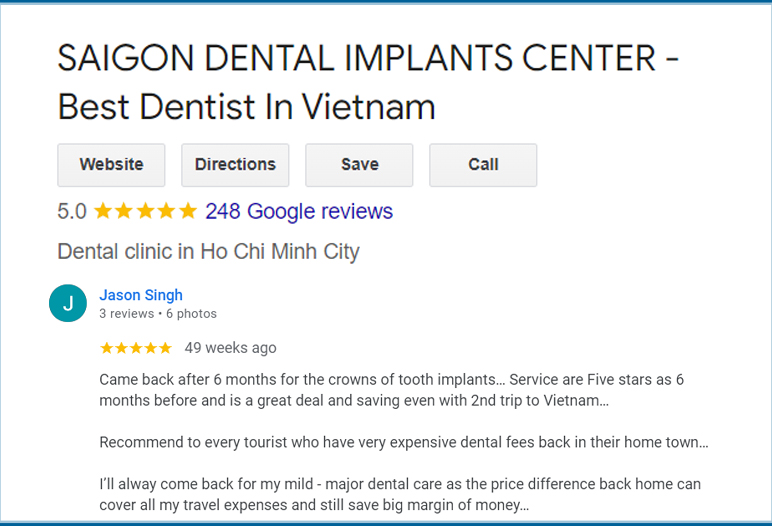
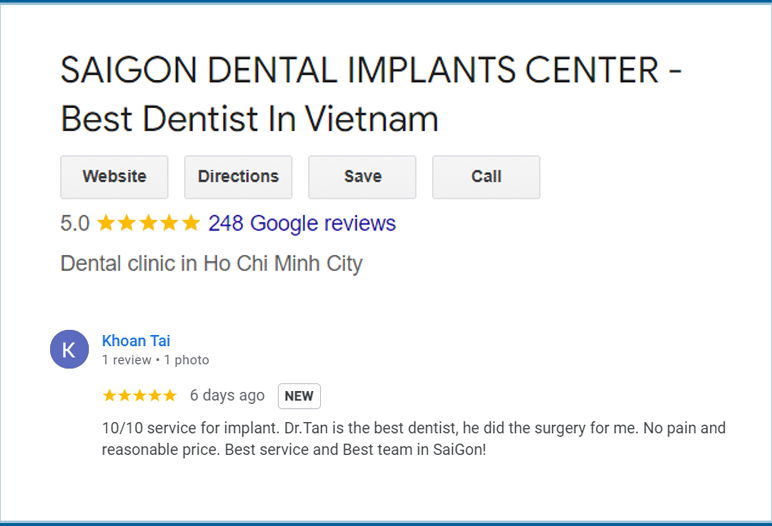
Utilizing review platforms
Engage with online review platforms such as Yelp, Healthgrades, and Google Reviews to read feedback from previous patients. Pay attention to recurring themes in the comments—whether positive or negative. This information often uncovers essential details about the dental practice’s approach to patient comfort, pain management, and post-operative care.
Identifying patterns
Look for patterns in patient experiences. Are there consistent remarks about staff professionalism and friendliness? How well does the dentist address patient questions and concerns? Identifying these patterns can help you make an informed decision about which practice aligns best with your expectations.
The process of getting dental implant dentures
Understanding the step-by-step process of obtaining dental implant dentures can ease your anxiety and prepare you for what lies ahead. This process typically begins with an initial consultation and culminates in the placement of the restoration.
Initial consultation and assessment
The initial consultation is where you will establish rapport with the dentist, discuss your goals, and undergo a thorough assessment of your oral health. This visit is pivotal as it sets the foundation for your treatment plan.
Reviewing your medical history
During your consultation, the dentist will review your medical history, discussing any existing conditions or medications you may be taking. Understanding your full medical profile allows the dentist to tailor the approach to your unique situation, ensuring safety and effectiveness during the procedure.
Performing a comprehensive oral examination
A comprehensive examination of your oral cavity will follow. The dentist will assess the condition of your gums, remaining teeth, and jawbone to determine if you are a suitable candidate for implants. Imaging techniques, such as X-rays and 3D scans, may be employed to gain a clear visual of your bone structure and detect any underlying issues.
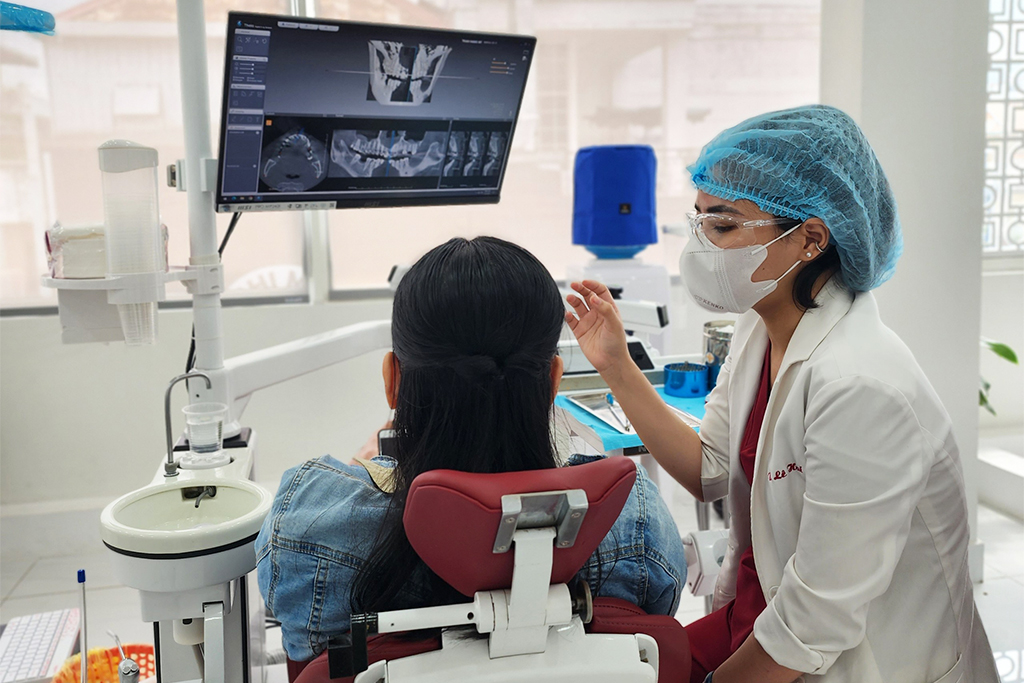
Discussing treatment options
Following the assessment, the dentist will present you with various treatment options tailored to your needs and budget. They will explain the number of implants required, types of restorations available—such as bridges or dentures—and different materials suited for your case. This is also the time for you to ask questions and voice any concerns you may have.
Surgical procedure overview
With a personalized treatment plan in hand, you will be prepared for the surgical procedure itself, which involves placing titanium posts into the jawbone.
Incision and bone preparation
The surgical procedure typically begins with the dentist making a small incision in the gum tissue to access the jawbone. Depending on your oral health, the dentist may need to prepare the bone, potentially using grafting material to ensure adequate support for the implant.
Implant placement
Once the preparation is complete, the titanium implant posts are carefully inserted into the jawbone. Positioning these implants accurately is critical, as their alignment directly affects function and longevity. The dentist will take every precaution to achieve optimal placement.
Suturing
After placing the implants, the incision is sutured closed, marking the beginning of the healing process. Over the following weeks, osseointegration occurs—an essential phase in which the implants fuse with the jawbone, establishing a stable foundation for the denture.
Recovery and aftercare instructions
Recovery is a vital part of the dental implant process, and adhering to aftercare instructions significantly influences your healing journey.
Medication management
Post-surgery, you will receive prescriptions for pain relief and antibiotics to ward off infection. It’s crucial to follow the prescribed regimen closely, managing discomfort while preventing complications during the recovery phase.
Soft food diet
During the initial stages of recovery, your body will require nourishment without straining the surgical site. Therefore, adhering to a soft food diet is advisable for several days or weeks. Foods such as yogurt, mashed potatoes, and smoothies can provide adequate nutrition while protecting your healing gums.
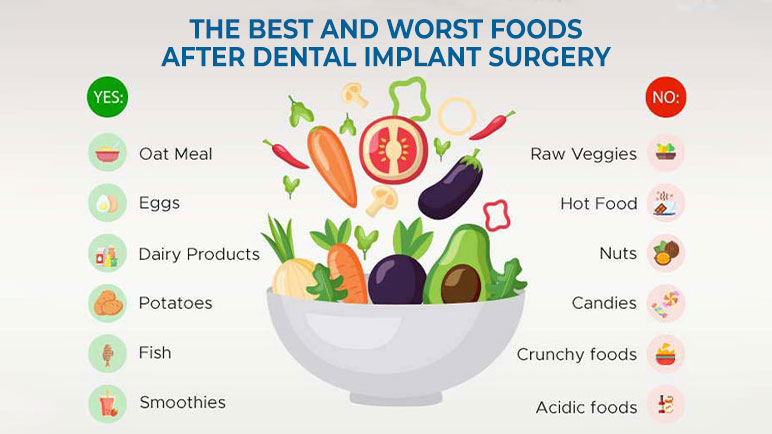
Oral hygiene
Maintaining good oral hygiene during recovery is essential, though it requires careful navigation around the surgical area. Gentle rinsing with salt water and light brushing of unaffected areas can help promote cleanliness without compromising the surgical site.
Swelling and bruising management
It’s common to experience swelling and bruising post-surgery. Employing ice packs and keeping your head elevated while resting can alleviate these symptoms and expedite your recovery.
Follow-Up appointments
Attending all scheduled follow-up appointments is essential for monitoring your healing progress. During these visits, the dentist will assess how well the implants integrate with the jawbone and ensure there are no complications.
Cost considerations for dental implant dentures
While dental implant dentures present a long-term solution, understanding the financial aspect of the investment is crucial for planning.
Average costs and factors influencing pricing
The cost of implant dentures varies based on multiple factors, significantly influencing your overall financial commitment.
Number of implants
The total number of implants needed plays a substantial role in determining pricing. For instance, full-arch dentures frequently necessitate additional implants compared to single-tooth replacements. Each implant adds to the overall expense.
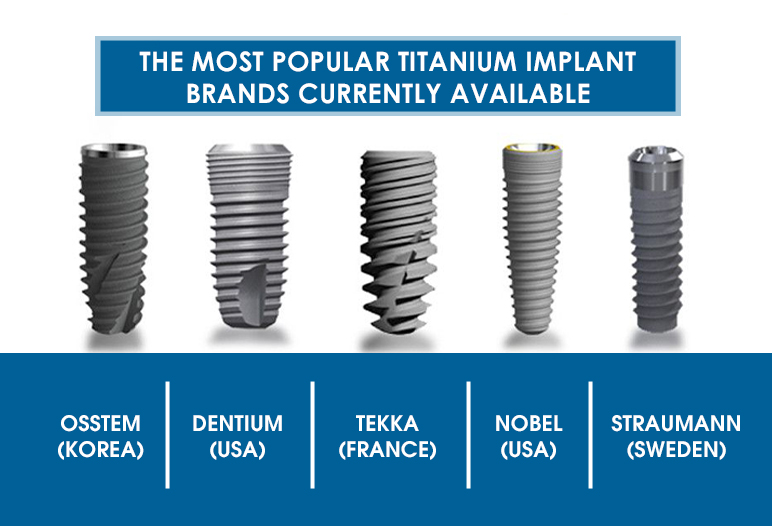
Complexity of the procedure
Certain cases may introduce complexities that elevate the cost, such as bone grafting or sinus lifts. If your jawbone requires augmentation, the added procedures will contribute to the final bill.
Type of restoration
Different restoration types—like screw-retained versus cemented dentures—carry varying costs based on the materials used and fabrication processes involved. Discussing these options with your dentist can clarify how each choice impacts the overall price.
Dentist’s fees
The experience and reputation of the dental professional can significantly impact the fees charged for the procedure. Highly experienced practitioners may charge a premium for their expertise, but their quality of work often justifies the investment.
Geographic location
The location of the practice can also influence pricing due to variations in the cost of living and market competition within the area. Urban centers may exhibit higher costs than rural locations.
Insurance coverage and payment plans
Understanding your insurance policy in relation to dental implants is fundamental to managing costs effectively.
Navigating insurance policies
Dental insurance coverage for implants can differ widely between policies. Some plans may cover partial costs, while others may exclude implants entirely. Carefully review your policy to ascertain the benefits and limitations surrounding implant procedures.
Payment plans offered by dental practices
Many dental offices provide payment plans tailored to assist patients in managing the costs associated with treatments. These plans typically allow you to break down the total amount into smaller, manageable monthly payments, easing financial strain.
Financing options available for patients
Should you lack sufficient insurance coverage, alternative financing options are worth exploring to facilitate your dental implant journey.
CareCredit
CareCredit is a popular option among patients seeking dental treatments. It enables flexible financing through various payment plans, helping you manage the costs of dental implants without depleting your savings.
Dental lending companies
Additionally, numerous dental lending companies specialize in providing loans specifically for dental treatments. These loans can grant you access to necessary funds for implant procedures while maintaining financial flexibility.
Health savings accounts (HSAs) and Flexible spending accounts (FSAs)
If you possess an HSA or FSA, utilizing these funds for eligible dental expenses could be an advantageous strategy. This approach not only reduces your taxable income but can also ease the financial burden of implant procedures.
Maintenance and care for dental implant dentures
Care and maintenance of dental implant dentures require ongoing attention, ensuring their longevity and functionality akin to natural teeth.
Daily cleaning routines
Establishing a diligent cleaning routine is essential for maintaining both your oral health and the integrity of your dental implant dentures.
Proper brushing techniques
Just as you would brush natural teeth, your implant dentures require regular brushing to eliminate plaque buildup and food particles. Utilize a soft-bristle toothbrush and non-abrasive toothpaste to preserve the surface of the dentures while ensuring cleanliness.
Flossing
Flossing is equally important, particularly around the connections between your implants and the dentures. Specialized floss threaders or interdental brushes can assist you in accessing tight spaces, promoting optimal oral hygiene.
Using antimicrobial mouthwash
Incorporating an antimicrobial mouthwash into your daily routine can further enhance your oral hygiene efforts. This helps reduce harmful bacteria and refreshes your mouth, supporting overall dental health.
Regular dental Check-ups
Scheduling regular dental check-ups is a cornerstone of maintaining your dental implant dentures and preserving oral health.
Professional cleanings
During your visits, the dentist will conduct thorough cleanings to remove any stubborn debris and tartar buildup. These professional cleanings help prolong the lifespan of your dental implants while ensuring the surrounding gums remain healthy.
Ongoing monitoring
Regular check-ups allow the dentist to monitor the state of your dental implants and the overall health of your oral cavity. Early detection of potential issues can lead to proactive measures, reducing the risk of complications.
Signs to watch for that indicate issues
Being attuned to signs of problems can empower you to seek timely intervention and preserve your dental implant health.
Pain or discomfort
Experiencing persistent pain or discomfort around your implants warrants immediate attention. This could indicate infection, improper integration, or other complications needing prompt evaluation.
Gum swelling or bleeding
Swelling or bleeding in the gum area surrounding your implants is another red flag. Such symptoms may signal inflammation or infection that should be addressed promptly by your dental professional.
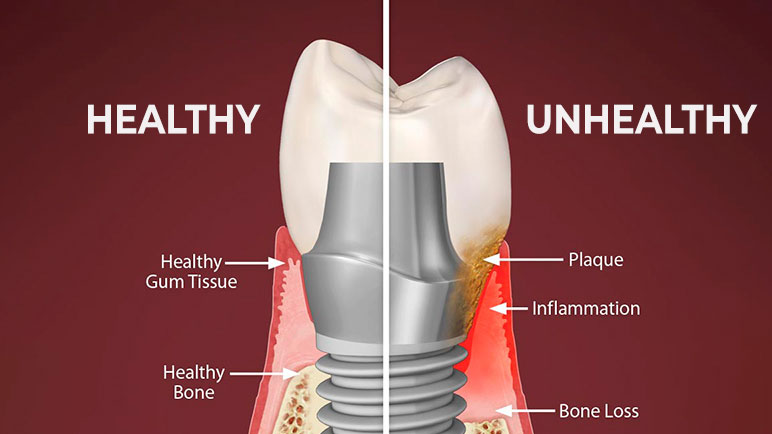
Mobility of implants
If you notice any mobility in your implants or feel they are not securely anchored, it’s essential to contact your dentist right away. Mobility suggests a failure in osseointegration and requires immediate investigation.
Conclusion
The journey towards restoring your smile through dental implant dentures can be both rewarding and transformative. With newfound confidence and enhanced functionality, you can engage in everyday activities without fear or hesitation. From the initial research phase to understanding the costs involved, each step is crucial in ensuring a smooth transition to your new dental fixtures.
By diligently evaluating your options, engaging with qualified professionals, and committing to proper aftercare and maintenance, you can safeguard your investment and enjoy the enduring benefits of dental implant dentures. Remember, achieving a healthy, confident smile is not merely about aesthetics; it’s about reclaiming your quality of life and the ability to engage fully in the world around you. So, as you search for implant-supported dentures near me or consider screw-in dentures, embrace the journey ahead, knowing that a radiant smile awaits on the other side.

 Google Reviews
Google Reviews Call
Call
SAIGON IMPLANT CENTER
Best dentist in Vietnam
Saigon Implant Center - Dental Clinic utilizes the latest technology for specialized treatment in the field of Single implant, full jaw implants, All on 4 implants, All on 6 implants, Zygoma implant....
SAIGON IMPLANT CENTER
Best dentist in Vietnam
Saigon Implant Center - Dental Clinic utilizes the latest technology for specialized treatment in the field of Single implant, full jaw implants, All on 4 implants, All on 6 implants, Zygoma implant....